Chinese startups conduct hot fire tests for mini version of SpaceX’s Starship
Thursday, 19 January 2023 21:26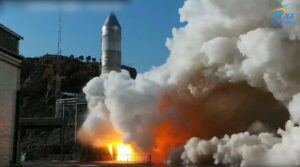
A Chinese launch startup has performed hot fire tests as part of development of a planned reusable stainless-steel rocket apparently inspired by SpaceX’s Starship.
The post Chinese startups conduct hot fire tests for mini version of SpaceX’s Starship appeared first on SpaceNews.
U.S. Space Force chief calls for greater collaboration with allies
Thursday, 19 January 2023 20:57
Gen. B. Chance Saltzman, chief of space operations of the U.S. Space Force, in a memo outlining his priorities said the service should pursue stronger partnerships with allies.
The post U.S.
HawkEye 360 satellites to provide data for U.S. Space Force threat-detection system
Thursday, 19 January 2023 20:18
Slingshot Aerospace is developing a system for the U.S. Space Force that will use data from HawkEye 360’s satellites to identify potential threats to GPS signals
Geostationary sounder is a key ingredient of near-term forecasts
Thursday, 19 January 2023 19:53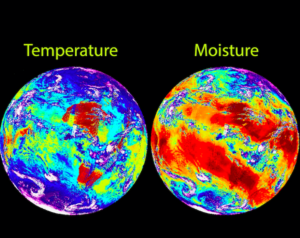
The National Oceanic and Atmospheric Administration’s next generation of geostationary weather satellites will significantly improve weather forecasting thanks to the addition of a hyperspectral infrared sounder.
The post Geostationary sounder is a key ingredient of near-term forecasts appeared first on SpaceNews.
Eutelsat 5 West A successfully retired in graveyard orbit
Thursday, 19 January 2023 19:51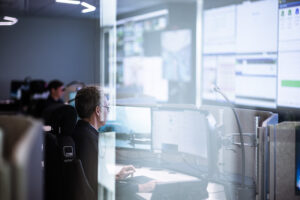
Eutelsat said Jan. 19 it retired a satellite last week that had helped Europe transition from analog to digital television two decades ago.
The post Eutelsat 5 West A successfully retired in graveyard orbit appeared first on SpaceNews.
Hera spacecraft to return to binary asteroid to survey crater left by DART
Thursday, 19 January 2023 16:43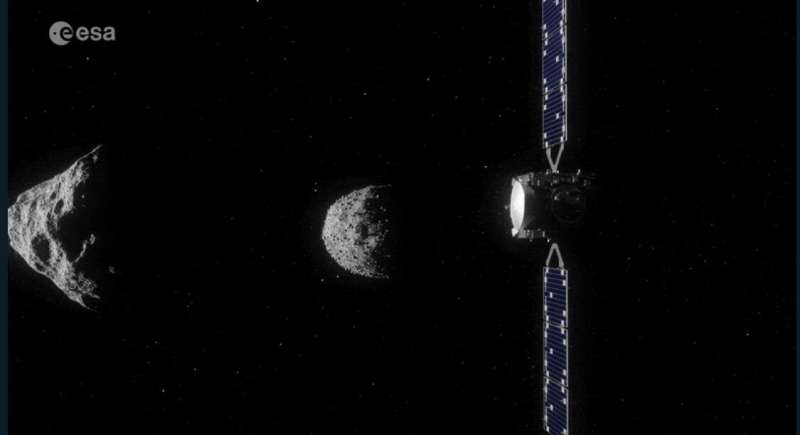
One of last year's space highlights was the NASA DART mission's collision with Dimorphos, the small moon of the binary asteroid Didymos (seen left). The impact measurably shifted the target asteroid's orbit around its primary while casting a plume of debris thousand of kilometers out into space.
Next comes ESA's Hera spacecraft which will return to the binary asteroid to perform a close-up survey of the crater left by DART, as well as measuring Dimorphos' mass and make-up, along with that of its central body.
"Hera is due to be launched in October 2024," explains Ian Carnelli, heading the mission. "In order to make that deadline our team has been working hard during the last year to finalize and test the various spacecraft subsystems—including the two CubeSats that will be deployed from Hera itself in the vicinity of Dimorphos. Meanwhile the overall mission passed its system Critical Design Review at the end of 2022, at the same time as Hera received funding for its launcher and operations.
"This coming year is when everything comes together: all elements of the Hera flight model are due to be integrated so that we can perform a full campaign of environmental testing on the spacecraft at ESA's ESTEC Test Center in the Netherlands.
With Starshield, SpaceX readies for battle
Thursday, 19 January 2023 14:00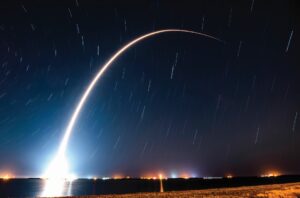
SpaceX is answering the Pentagon’s call for more commercial allies with Starshield, a business that will leverage its manufacturing might to provide custom- built spacecraft, sensors, and secure communications services.
The post With Starshield, SpaceX readies for battle appeared first on SpaceNews.
Future-proofing ice measurements from space
Thursday, 19 January 2023 13:06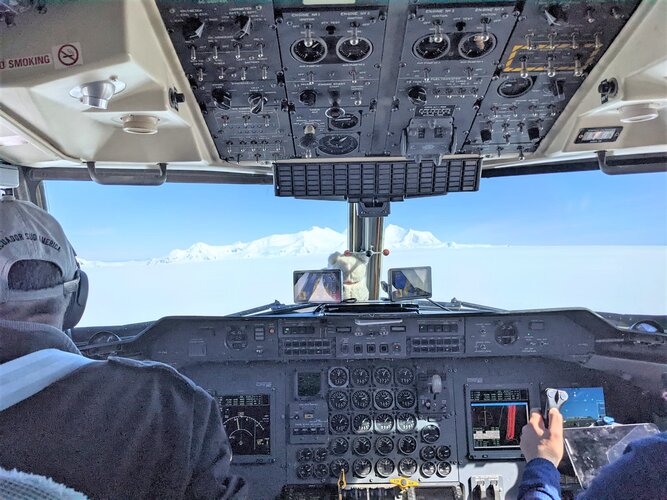
With diminishing ice one of the biggest casualties of our warming world, it’s imperative that accurate measurements continue to be made for scientific research and climate policy, as well as for practical applications such as ship routing.
To ensure that ESA and NASA are getting the best out of their ice-measuring satellites and to help prepare for Europe’s new CRISTAL satellite, the two space agencies along with the British Antarctic Survey and a team of scientists teamed up recently to carry out an ambitious campaign in Antarctica.
Space Capital sees upside to 2022 decline in space investment
Thursday, 19 January 2023 13:00
Last year was rough for space startups. Overall investment dropped 58 percent from its $47.4 billion peak in 2021 to $20.1 billion in 2022.
The post Space Capital sees upside to 2022 decline in space investment appeared first on SpaceNews.
NASA faces “difficult choices” for current and future Earth science missions
Thursday, 19 January 2023 12:20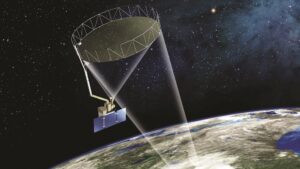
The co-chair of the most recent Earth science decadal survey warned that NASA faces “difficult choices” between continuing current missions and starting new missions given limited funding.
The post NASA faces “difficult choices” for current and future Earth science missions appeared first on SpaceNews.
ClearSpace raises $29 million ahead of first debris removal mission
Thursday, 19 January 2023 08:00
Swiss startup ClearSpace said Jan. 19 it has raised about $29 million to support its first space debris removal mission in 2026.
The post ClearSpace raises $29 million ahead of first debris removal mission appeared first on SpaceNews.
Zero-Covid left in dust as Chinese revellers fuel travel boom
Thursday, 19 January 2023 07:13 Armed with selfie sticks and freshly recovered from Covid, Chinese tourists ambled through bar streets in the country's backpacker haven of Dali, partying the stress of the past three years into oblivion.
As Lunar New Year approaches, China is seeing a domestic travel boom after the government abruptly dismantled its longstanding zero-Covid strategy last month.
"I feel so free," said Hu,
Armed with selfie sticks and freshly recovered from Covid, Chinese tourists ambled through bar streets in the country's backpacker haven of Dali, partying the stress of the past three years into oblivion.
As Lunar New Year approaches, China is seeing a domestic travel boom after the government abruptly dismantled its longstanding zero-Covid strategy last month.
"I feel so free," said Hu, Blocking radio waves and electromagnetic interference with the flip of a switch
Thursday, 19 January 2023 07:13 Researchers in Drexel University's College of Engineering have developed a thin film device, fabricated by spray coating, that can block electromagnetic radiation with the flip of a switch. The breakthrough, enabled by versatile two-dimensional materials called MXenes, could adjust the performance of electronic devices, strengthen wireless connections and secure mobile communications against int
Researchers in Drexel University's College of Engineering have developed a thin film device, fabricated by spray coating, that can block electromagnetic radiation with the flip of a switch. The breakthrough, enabled by versatile two-dimensional materials called MXenes, could adjust the performance of electronic devices, strengthen wireless connections and secure mobile communications against int Raytheon to develop command and control system for U.S. Air Force
Thursday, 19 January 2023 07:13 Raytheon BBN has been awarded a contract by the U.S. Air Force to develop a rocket cargo mission planning, and Command and Control, or C2, system for the U.S. Air Force. The contract has a potential value of $8.7 million over four years and is part of the U.S. Air Force 2030 Science and Technology Strategy's transformational science and technology portfolio.
During the initial 30-month eff
Raytheon BBN has been awarded a contract by the U.S. Air Force to develop a rocket cargo mission planning, and Command and Control, or C2, system for the U.S. Air Force. The contract has a potential value of $8.7 million over four years and is part of the U.S. Air Force 2030 Science and Technology Strategy's transformational science and technology portfolio.
During the initial 30-month eff 

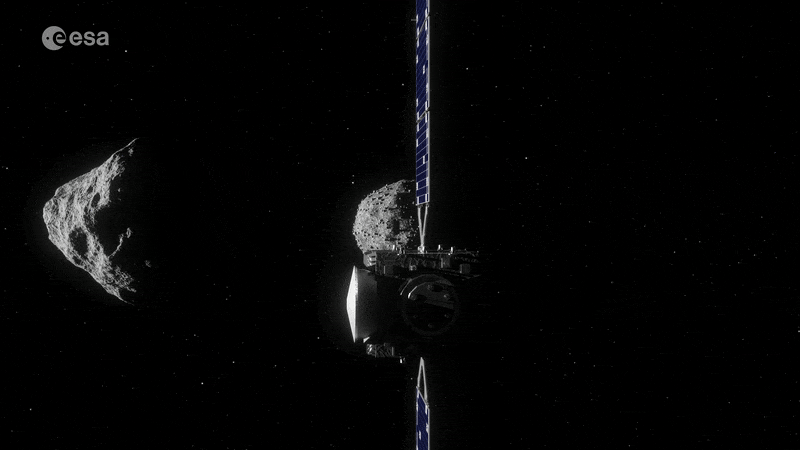 Image:
Hera’s time of trial
Image:
Hera’s time of trial